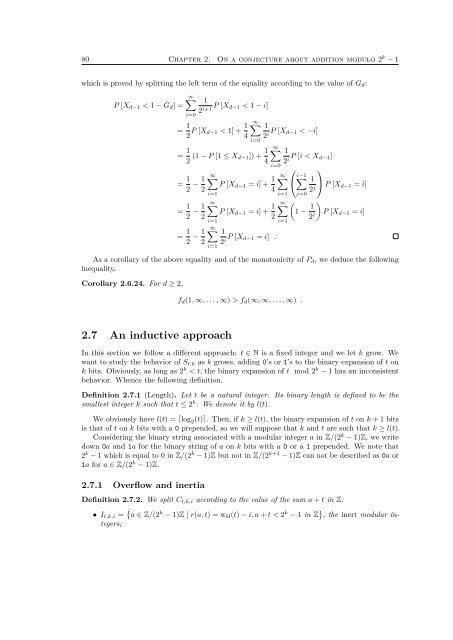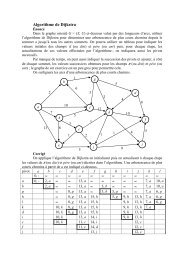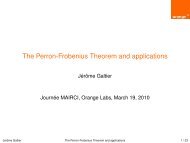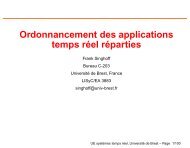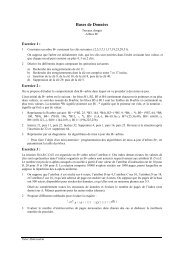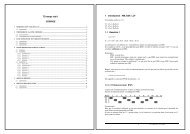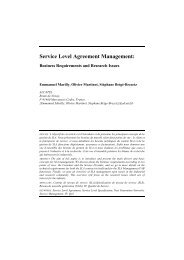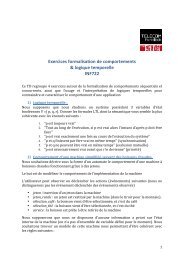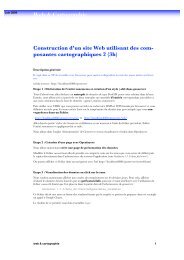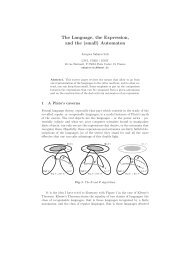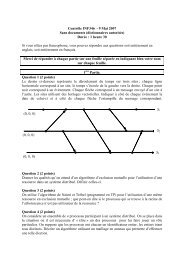here - Sites personnels de TELECOM ParisTech - Télécom ParisTech
here - Sites personnels de TELECOM ParisTech - Télécom ParisTech
here - Sites personnels de TELECOM ParisTech - Télécom ParisTech
You also want an ePaper? Increase the reach of your titles
YUMPU automatically turns print PDFs into web optimized ePapers that Google loves.
80 Chapter 2. On a conjecture about addition modulo 2 k − 1which is proved by splitting the left term of the equality according to the value of G d :P [X d−1 < 1 − G d ] =∞∑i=012 i+1 P [X d−1 < 1 − i]= 1 2 P [X d−1 < 1] + 1 4∞∑i=012 i P [X d−1 < −i]= 1 2 (1 − P [1 ≤ X d−1]) + 1 ∞∑ 14 2 i P [i < X d−1]i=0⎛ ⎞= 1 2 − 1 ∞∑P [X d−1 = i] + 1 ∞∑ ∑i−1⎝1⎠24 2 j P [X d−1 = i]i=1i=1i=1i=1j=0= 1 2 − 1 ∞∑P [X d−1 = i] + 1 ∞∑(1 − 1 )22 2 i P [X d−1 = i]= 1 2 − 1 2∞∑i=112 i P [X d−1 = i] .As a corollary of the above equality and of the monotonicity of P d , we <strong>de</strong>duce the followinginequality.Corollary 2.6.24. For d ≥ 2,f d (1, ∞, . . . , ∞) > f d (∞, ∞, . . . , ∞) .2.7 An inductive approachIn this section we follow a different approach: t ∈ N is a fixed integer and we let k grow. Wewant to study the behavior of S t,k as k grows, adding 0’s or 1’s to the binary expansion of t onk bits. Obviously, as long as 2 k < t, the binary expansion of t mod 2 k − 1 has an inconsistentbehavior. Whence the following <strong>de</strong>finition.Definition 2.7.1 (Length). Let t be a natural integer. Its binary length is <strong>de</strong>fined to be thesmallest integer k such that t ≤ 2 k . We <strong>de</strong>note it by l(t).We obviously have l(t) = ⌈log 2 (t)⌉. Then, if k ≥ l(t), the binary expansion of t on k + 1 bitsis that of t on k bits with a 0 prepen<strong>de</strong>d, so we will suppose that k and t are such that k ≥ l(t).Consi<strong>de</strong>ring the binary string associated with a modular integer a in Z/(2 k − 1)Z, we writedown 0a and 1a for the binary string of a on k bits with a 0 or a 1 prepen<strong>de</strong>d. We note that2 k − 1 which is equal to 0 in Z/(2 k − 1)Z but not in Z/(2 k+1 − 1)Z can not be <strong>de</strong>scribed as 0a or1a for a ∈ Z/(2 k − 1)Z.2.7.1 Overflow and inertiaDefinition 2.7.2. We split C t,k,i according to the value of the sum a + t in Z:• I t,k,i = { a ∈ Z/(2 k − 1)Z | r(a, t) = w H (t) − i, a + t < 2 k − 1 in Z } , the inert modular integers;


